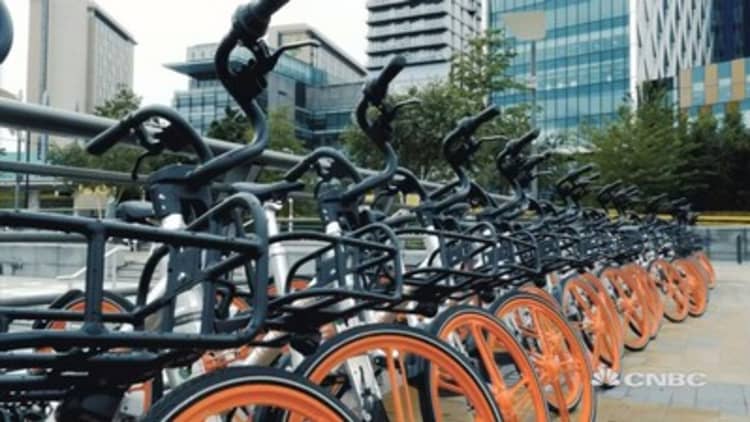
In China, investors are committing a lot of capital right now to a new twist on an old form of transportation: the bicycle.
Specifically, bike-sharing start-ups in China are enjoying surging growth with a simple concept: Users download an app on their smartphones, which allows them to locate and unlock a nearby bike. It's a cheap service, with providers charging as little as 15 cents for every 30 minutes.
When the trip is completed, riders are encouraged to park at any public bike rack or public location that does not interfere with pedestrians or traffic. It's a very different model than traditional bike-sharing programs, where users must pick up and drop off bikes at fixed, designated racks.
Investors are piling in. Mobike and Ofo — two of the biggest players in the market — recently raised a combined $1.3 billion in new funding. The companies hope to one day bring this popular business to the United States, as they try to disrupt traditional bike-sharing programs and outmaneuver American-based start-ups now launching their own such services.
It's easy to understand investor excitement about these companies, given their massive scale. Mobike and Ofo can now complete a combined 50 million rides per day. They each boast 100 million registered users, offer their services in more than 100 cities and operate a combined fleet of more than 12 million bicycles.
"Right now, we are transporting more people than taxis in China in many cities," Mobike CEO Davis Wang said recently at Fortune's Brainstorm Tech conference. "And in some cities, for example in Chengdu, we are transporting more people than the subway. So MoBike is becoming one of the major transportation platforms in many of the cities in which we operate."
Mobike recently raised $600 million in new funding from investors including Tencent, TPG and Sequoia. Neil Shen, the managing partner of Sequoia Capital China, told CNBC his firm is optimistic about the company in part because of the flexibility it provides customers.
"Bike sharing allows users to park their bikes anywhere they want, unlike previous city-bikes where riders had to look for designated dock stations," Shen said. "The ability to use a bike whenever and wherever without having to worry about losing or maintaining the bike offers great flexibility that cannot be imitated with public transit options."
Not to be outdone, Ofo recently announced its own mega round of $700 million in new funding, from a group of investors that included Alibaba, Chinese ride-hailing company Didi Chuxing and DST Global.
Jeffrey Towson, a professor at Peking University, says that the uptake for these services is significant and appears stable. He does highlight areas of potential caution, though, including the fact that there are no real barriers to entry in this market. He says that could limit the long-term profitability of the companies.
"It's still a very good business, but doesn't have the awesome economics of Didi, Uber, and Airbnb," Towson said. "Of course, these are still early days and their business model is still changing. Many of the most successful businesses such as Google and Facebook didn't really figure out their business models until later. They were a consumer phenomenon at the beginning."
Another concern for investors: signs of possible excess in the market, with widely circulated photos of bikes dumped in huge piles on city streets in China.
When asked by CNBC about those images, an Ofo spokesperson blamed the behavior on "different people with different agendas that sabotage the bikes" but also emphasized that it is working on solutions including smart locks and location services for its fleet.
Despite these hurdles, both companies are already eying international opportunities. Mobike has expanded to Shanghai, Japan and England and hopes to launch in the U.S., as does Ofo, which says that it has conducted trials in California. However, if and when these two Chinese companies do begin catering to American bike-sharing customers, they could face real competition.

The incumbent in the U.S. bike-sharing market is Motivate, which operates bike-sharing programs in nine metro areas including New York. There, the company, which says it is profitable, runs Citi Bike, where fans rent bikes from fixed stations throughout the city. On average, there were nearly 50,000 rides per day in May. The cost is $12 for a day pass.
Competition could also come from VC-backed start-ups like LimeBike, which more closely emulates the Chinese model of dockless bike-sharing. It remains to be seen just how many local city officials and urban planners in the United States will enthusiastically embrace this model. Still, Sand Hill Road is placing bullish bets.
LimeBike has already raised $12 million, including money from Andreessen Horowitz. Jeff Jordan, a general partner at that firm, says the costs of running this new form of bike-sharing are far less than building and maintaining traditional, fixed kiosks. He also sees business opportunity in the vast amount of data such start-ups could collect about their users.
"The thing that gets really interesting is they will know your location and where you are," Jordan said. "So if you're about to park your bike and there are two different coffee places near you, which one do you want to go to? You begin to feel that there could be other ancillary businesses if this actually succeeds and gets high utilization."
The next city to test LimeBike's technology: Seattle, where the company says it expects to launch this week.


